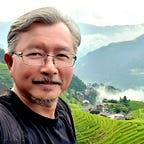The Human Condition
Day Twenty Seven
The Chinese civilisation has been said to be a monolithic whole yet diverse. Since the time of the Imperial Qin dynasty, the mainland has been unified with one writing system and by the time Emperor Han Wudi ruled China, Confucianism has been the predominant orthodox philosophy which defines Chinese culture. However many schools of thought continued to contend and are woven into Chinese culture with many strands.
Confucius, like many of his students and peers who lived in the glorious Axial Age which produced the many schools of philosophical thought, would be quick to say that the task of intellectuals is to bear the burden of the well-being of the country and the people, and to attempt to address the many challenges facing the ordinary peasant folks. The 20th century author Lin Yutang puts it well, in entitling his book of reflections, “My Country, My People”.
In a nutshell, the scholars and sages of Chinese history in promulgating the various social and political philosophy throughout the millenia of history was seeking to address one fundamental concern, viz., the human condition. It is the root of social changes amidst the chaos and confusion as well as glorious golden age of human accomplishments and material culture. As I probe the history of philosophical anthropology from Socrates to Sartre in the Western civilisation, I concur that the concern is universal.
Confucius was said to have been eager to offer his learning and solutions for peacebuilding to the kings of seven warring states during his lifetime. But he opted for a lifetime of working on character formation through education with the next generation, one cohort at a time.
Laozi was even more radical, advising that peace can only come when individuals retreat to cultivate their hearts and minds and indeed spirits, one at a time. Zhuangzi encouraged us to be open to learn from the many diverse points of view. But it can come only when we learn to be quiet and to practise silence in our hearts.
For activists who long for quick and sometimes radical solutions to see quick results, these sages of old may appear to be stumbling blocks on the path towards history. Yet they may have the wisdom we seek. Let us learn to be quick to listen and slow to speak. We have a lifetime to understand the human condition and
“Blessed are the peacemakers, for they shall be called sons of God”. Matthew 5:9
Journey with me over 40 days as I reflect on life and hope in the wilderness of the human condition
Previous Day’s reflection on the Flight does all the Talking. See next Reflection on the Spirit of the Martyrs
